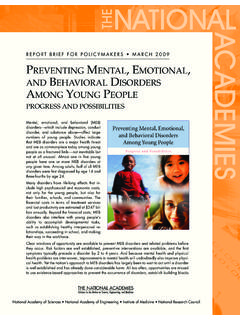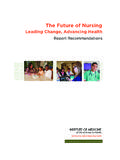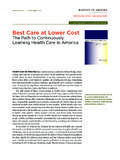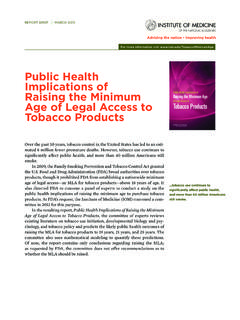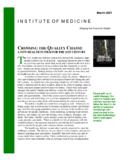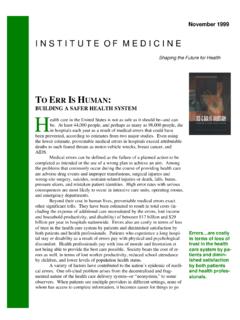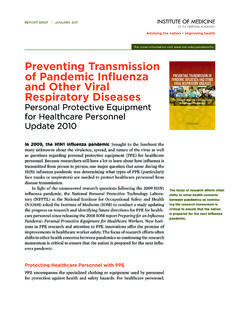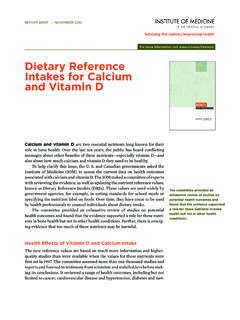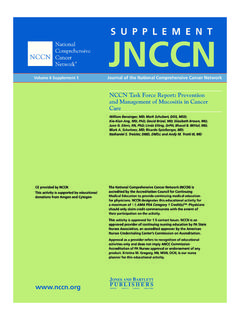Transcription of Meeting Psychosocial Health Needs - National …
1 Advising Care for the Whole Patient: Meeting Psychosocial Health Needs2 Common Psychosocial Problems Lack of info, knowledge, skills to manage illness Anxiety, depression, other emotional distress Impaired work, school, other roles Financial problems Lack of transportation, other logistical resources Lack of social supports 3A Problem with Care for cancer 28% of patients report doctor doesn t pay attention to other than medical care; 33% of ASCO members report no screening for distress Only 3 of 18 members of National Comprehensive cancer Network routinely screen allpatients for distress 4 Patients also report Health care providers do not: consider Psychosocial care integral to quality cancer care. understand Psychosocial Needs , know about resources, or refer.
2 President s cancer Panel 2003,2004 Why should Health care providers concern themselves with patients Psychosocial problems ?6 Unmet Psychosocial Needs : Increase death and disease burden; Social isolation comparable to smoking &cholesterol 66% higher risk of dying within 6 yrs in socially isolated womenwith breast cancer (Kroenke, 2006) Prevent good Health care; , 8percent of families having a member with cancer delayed or did not receive care because of cost. Reduce patient adherence to treatment; , depression: Impairs thinking; memory Weakens motivation Promotes poor coping; , smoking, medication misuse, unhealthy eating 7 Other Adverse Effects of Stress Depression 20-25 % experiencing major stressful events develop depression.
3 Onset / progression of other diseases; , heart disease Imbalance in neuro-endocrine & immune system functions and components; affecting , Cell growth and replication Tumor metabolism and evasion of body s defenses 8 Can something be done to address Psychosocial stress ?9 Psychosocial Needs and Formal Services to Address Them (1/2) Comprehensive illness self-management/self-care programsHelp managingillness Peer support programs Counseling/psychotherapy Pharmacological management of mental symptomsHelp coping withemotions Provision of info; , on illness, treatments, effects on Health , and Psychosocial services, and helping pts/families understand and use this info Information aboutillness, treatments, Health , servicesHealth ServicesPsychosocial Need10 Financial planning / counseling / daily management Insurance ( , Health , disability) counseling Eligibility assessment /counseling for benefits.
4 , SSDI Supplemental financial grantsFinancial advice / assistance Family / caregiver education Assistance with ADLs, IADLs, chores Legal protections / services, , under ADA / Family and Medical Leave Act Cognitive testing / educational assistanceHelp managingdisruptions in work,school, and family life Provision of resourcesMaterial and logisticalresources, , transportation Behavioral/ Health promotion interventions; , Provider assessment/monitoring of Health behaviors ( , smoking, exercise) Brief counseling Patient educationAssistance changingbehaviors to minimizeimpact of diseaseHow to make sure patients who need services receive them 12 Model Interventions Meeting Criteria RWJ Building Health Systems for People with Chronic Illnesses (Palmer and Somers, 2005) Chronic Care Model (ICIC, 2007) Clinical Practice Guidelines for Distress Management (NCCN, 2007) Clinical Practice Guidelines for the Psychosocial Care of Adults with cancer (Australia, 2003) Improving Supportive and Palliative Care for Adults with cancer (NICE, 2004) Collaborative Care of Depression in Primary Care (Katon, 2003)
5 Three Component Model (3CM ) Project IMPACT Collaborative Care Model (Unutzer et al., 2002) Partners in Care (Wells et al., 2004) Promoting Excellence in End-of-Life Care Program (Byock et al., 2006)13 Common Components of Effective Interventions Process to Identify Patients with Needs Care Planning Mechanisms to Link Patients to Services Support for Illness Self-Management Mechanisms for Coordinating Care Follow-up on Care Delivery14 Model for the delivery of Psychosocial Health of Psychosocial Needs Patient Provider PartnershipProvider TeamFollow-up and Re-evaluationDevelopment and Implementation of a Plan To:Link patient / family withneeded servicesSupport patients: Provide information Identify strategies to address Needs Provide emotional support Help pts manage illness/ healthCoordinate carePatient/FamilyEffective Patient Provider Communication15 Psychosocial Health servicesPsychosocial Health services are psychological and social services and interventionsthat enable patients, their families, and Health care providers to optimize biomedical Health care and to manage the psychological/behavioral and social aspects of illness and its consequences so as to promote better is now known to support a standard of care for the delivery of Psychosocial Health services in cancer care.
6 17 Recommendation 1: The standard of parties establishing or using standards for the quality of cancer care should adopt the following as a standard: All cancer care should ensure the provision of appropriate Psychosocial Health services by: Facilitating effective communication between patients and care providers. Identifying each patient s Psychosocial Health Needs . Designing and implementing a plan that: Links the patient with needed Psychosocial services. Coordinates biomedical and Psychosocial care. Engages and supports patients in managing their illness and Health . Systematically following up on, reevaluating, and adjusting for cancer Care ProvidersRuth McCorkle RN, PhDFlorence S. Wald Professor of Nursing and Director, Center for Excellence in Chronic Illness CareYale University School of NursingLee Schwartzberg MDMedical Director, The West Clinic19 Recommendation 2: Health care cancer care providers should ensure that every cancer patient within their practice receives care that meets the standard for Psychosocial Health care.
7 20 Commitment from practice leadership Work redesign21 Different approaches for implementing the standard of and integrating Psychosocial and biomedical Health local remote approaches 22 Clinical Practice communication with illness self management Some Tools / ApproachesRoutine patient visitsPatient letterPatient self-screening Health behavior assessment / interventionRefer to free, community/ remote services Repeat screening, monitoring by phone, involving patients, The inability to solve all Psychosocial problems permanently should not preclude attempts to remedy as many as possible a stance akin to treating cancer even when the successful outcome is not assured. 24 Implications for Advocacy OrganizationsDiane Blum MSW, Executive Director, CancerCare25 Patient Needs Well functioning patient-provider partnership, characterized by good communication Knowledge about Psychosocial Health services which will assist the patient in participating in care Support in communicating about / using these services 26 Role of Advocacy Organizations Strengthen the patient side of the patient-provider partnership Utilize tools that have been found to be effective Strengthen the patient side of the relationship through provision of new tools and services272829 Recommendation 3:Patient and family education and advocacy organizations should.
8 Educate patients with cancer and their family caregivers to expect, and request when necessary, cancer care that meets the standard for Psychosocial care. continue strengthening the patient side of the patient provider partnership .. by providing tools and training in obtaining information, making decisions, solving problems, and better communicating with their Health care for Health Care PurchasersSherry GliedPhD,ChairDepartment of Health Policy and Management, Mailman School of Public Health , Columbia University31 Much is low cost or already reimbursable Element of communication with illness self management / ReimbursementProvided for in E&M billing codesPerformed by patient/ family Standard office practice; , referralsNew billing codes.
9 Health and Behavior Assessment codes32 Health and Behavior Assessment / Intervention billing codes Health and behavior assessment procedures are used to identify the psychological, behavioral, emotional, cognitive, and social factors important to the prevention, treatment, or management of physical Health focus of the assessment is ..on the biopsychosocialfactors important to physical Health problems and treatments. The focus of the intervention is to improve the patient s Health and well-being utilizing cognitive, behavioral, social, and/or psychophysiologicalprocedures designed to ameliorate specific disease-related 96150-96155 describe services offered to patients who present with primary physical illnesses, diagnoses, or symptoms and may benefit from assessments and interventions that focus on the biopsychosocialfactors related to the patient s Health 96150 Health and behavior assessment ( , Health -focused clinical interview, behavioral observations, psychophysiologicalmonitoring, Health -oriented questionnaires)
10 , each 15 minutes face-to-face with the patient, initial assessment 96151 re-assessment 96152 Health and behavior intervention, each 15 minutes, face-to-face; individual 96153 group (2 or more patients) 96154 family (with the patient present) 96155 family (without the patient present).33 Psychologist Claims Paid by Medicare, 2003 2005, by Type of Intervention, and Comparison 2005 Claims Paid for All Provider Types 454,386412,913390,492254,833 TotalMedicare does not reimburse for this type of interventionH/B Intervention family (without patient present)961557,9427,5087,0036,129H/B Intervention family (with patient present) 9615434,05217,87316,4319,252H/B Intervention group (two or more patients)96153300,463291,103245,088136,9 04H/B Intervention face-to-face, individual9615221,91318,42147,599 51,888H/B Reassessment9615190,01678,00874,37150,66 0H/B Assessment961502005 All Provider Claims2005 Psychologist Claims2004 Psychologist Claims2003 Psychologist Claims Description Code 34 Recommendation: Support from purchasers should include provisions in their contracts and agreements with Health plans that ensure coverage and reimbursement of mechanisms for identifying the Psychosocial Needs of cancer patients, linking patients with appropriate providers who can meet those Needs , and coordinating Psychosocial services with patients biomedical care.
